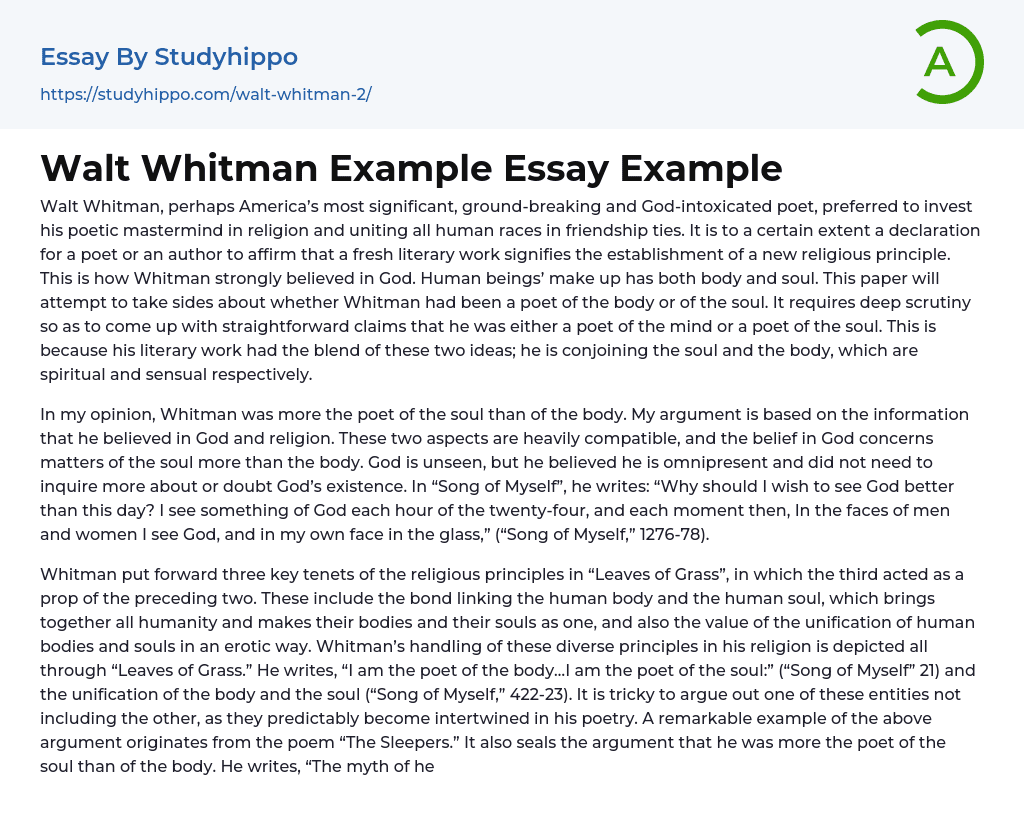Walt Whitman, an influential and imaginative poet in America, had a deep connection with religion and the idea of uniting all races in friendship. He believed that his literary works represented new religious principles, demonstrating his strong faith in God. Whitman acknowledged that humans are composed of both the physical body and the soul. This analysis aims to determine whether Whitman's focus was on the physical or spiritual aspects through careful examination of his writings. It is evident that his works merge these two concepts, combining the spiritual soul with the sensual body.
Whitman's poetry focuses primarily on the soul rather than the body, which is based on his belief in God and religion. These two aspects are closely intertwined, as the concept of God relates to matters of the soul rather than physicality. Despite being un
...seen, Whitman firmly believed in God's omnipresence and had no need to question His existence further. In his poem "Song of Myself," he expresses that there is no need for him to aspire to see God better than each day because he sees glimpses of God every hour and moment in the faces of men and women, as well as in his own reflection ("Song of Myself," 1276-78).
In "Leaves of Grass," Whitman presented three main principles of his religious beliefs, with the third principle supporting the previous two. These principles include the connection between the human body and soul, which unites all of humanity and merges their bodies and souls. Additionally, Whitman emphasized the importance of the erotic unification of human bodies and souls. Throughout "Leaves of Grass," Whitman explores these diverse principles in his religion. He declares, "I am
the poet of the body...I am the poet of the soul" ("Song of Myself" 21), highlighting the unification of body and soul ("Song of Myself," 422-23). It is difficult to separate these entities in his poetry as they naturally intertwine. One notable example illustrating this argument is found in the poem "The Sleepers." This poem further reinforces Whitman's focus on the soul over the body. He asserts, "The myth of heaven indicates the soul; The soul is always beautiful...it appears more or it appears less, it comes or lags behind, it comes from its embowered garden and looks pleasantly on itself and encloses the world" ("The Sleepers" 167-169).
Whitman's exploration of human character addresses both the soul and the body as inseparable components, thus establishing the foundation for his new religion. In his poem "Song of Myself," he succinctly asserts, "...the soul is not more than the body…the body is not more than the soul… nothing, not God, is greater to one than one's-self is" (1262-64). These audacious and somewhat sacrilegious lines unmistakably convey Whitman's belief in the unity of body and soul.
- Age Of Enlightenment essays
- Ethos essays
- Time essays
- Acceptance essays
- Meaning Of Life essays
- Reality essays
- Natural Law essays
- Political Philosophy essays
- Utilitarianism essays
- Existence essays
- Free Will essays
- Good And Evil essays
- Confucianism essays
- Relativism essays
- Conscience essays
- Environmentalism essays
- Empiricism essays
- Epistemology essays
- Ethics essays
- Existentialism essays
- Human Nature essays
- Individualism essays
- Metaphysics essays
- Philosophy Of Life essays
- Transcendentalism essays
- Truth essays
- Destiny essays
- Determinism essays
- Fate essays
- Functionalism essays
- Philosophers essays
- Pragmatism essays
- Future essays
- Child Observation essays
- Critical Reflection essays
- Teaching Philosophy essays
- Personal Philosophy essays
- Action Speak Louder Than Words essays
- Can Money Buy Happiness essays
- Values of Life essays
- Ethical dilemma essays
- Normative Ethics essays
- Virtue Ethics essays
- Belief essays
- Deontology essays
- Moral essays
- Virtue essays
- Work Ethic essays
- Henry David Thoreau essays
- Carl Jung essays




